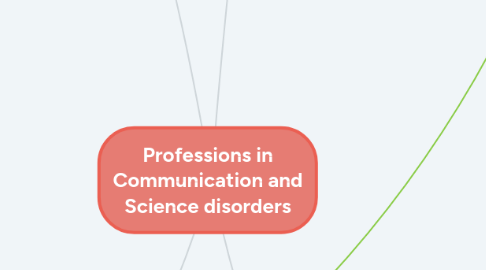
1. Professional aides/assistants
1.1. Reffered to paraprofessionals, SLP assistants, or Audiology assistants
1.2. Help in screenings, clerical work, preparation of materials, and to calibrate instruments
1.3. May work only with supervision
1.4. Not permitted to interpret test results, develop a plan, give family counseling, and discharge a patient
1.5. Bachelors/assocites degree with respective requirements
1.6. Work in respective environments to SLPS & Audiologists
2. Speech-Language and hearing Scientists
2.1. extend knowledge of human communication processes and disorders
2.2. investigate ways in which children learn their native tongues
2.3. difference and similarities of languages
2.4. Study the natures of language disorders
2.5. develop and improve assistive listening devices
2.6. investigate the nature of sound, noise, and hearing
2.7. Doctorate degree, either phD, or EdD
2.8. works in universities, Gov't agencies, industry, research centers, and clinics
3. Speech-Language Pathologist (SLP)
3.1. work to prevent, access, diagnose, and treat communication disorders
3.1.1. Swallowing disorders
3.1.1.1. Feeding & Swallowing difficulties ex:dysphagia
3.1.2. speech disorder
3.1.2.1. has difficulty producing speech sounds fluently. ex: stutter
3.1.3. Social communication disorder
3.1.3.1. has trouble with the social use of verbal/nonverbal communication ex: Autism
3.1.4. Language disorder
3.1.4.1. Person has trouble sharing/understanding others thoughts, ideas, and feelings ex: Aphasia
3.1.5. Cognitive-communication disorder
3.1.5.1. Problems paying attention,remembering,and problem solving. ex: experience traumatic brain injury/ genetic disorders
3.2. bachelors degree
3.2.1. Student teaching experience, 1-2 years of experience, pass (NTE)
3.2.1.1. School Licensure
3.3. Masters/ doctoral degree
3.3.1. Must graduate from CAA-acredited program, 25 hours of clinical observation,350 hours of clinical practice,9 months of paid clinical experience, pass National SlP exam(NTE), CEUs
3.3.1.1. State Licensure (CCC-SLP)
3.4. works in Rehabs, Clinics, School settings, hospitals private practices, also independent professionals
4. Audiologist
4.1. Specialists who measure hearing abilities, and identify, and assess, manage, and prevent disorders of hearing and balance
4.1.1. Hearing loss through old age
4.1.1.1. severity can be from mild to severe,may involve one or two ears. hearing loss may be conductive, sensorineural,or mixed.
4.1.2. Balance disorders
4.1.3. Titinus
4.1.4. Select, fit, and despense hearing aids
4.1.5. work with patients with cochlear implants
4.2. Doctoral degree/A.u.D
4.2.1. Formal training from a certified program, additional clinical experience, pass national exam
4.2.1.1. State license ASHA (ASHA CCC-A
4.2.1.2. no school licensure, unlike
